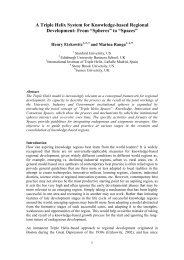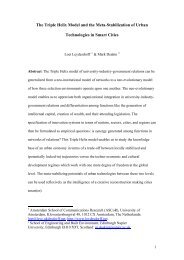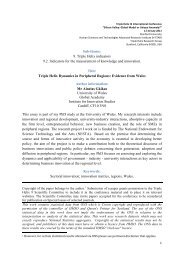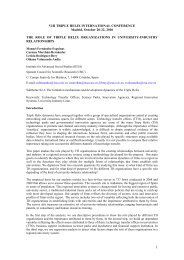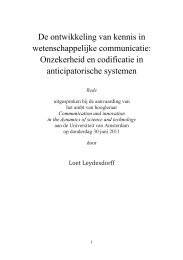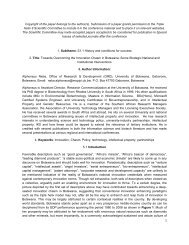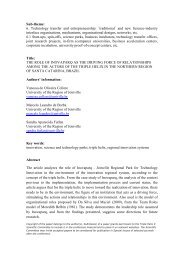TRIPLE HELIX noms.pmd
TRIPLE HELIX noms.pmd
TRIPLE HELIX noms.pmd
You also want an ePaper? Increase the reach of your titles
YUMPU automatically turns print PDFs into web optimized ePapers that Google loves.
O-137Conflicts of Interest By Research-Based Spin-off FirmsAnna Pobol, Belarusian State University, BelarusCopyright of the paper resides with the author(s). Submission of a paper grants permission to the 8th Triple Helix InternationalScientific and Organizing Committees to include it in the conference material and to place it on relevant websites. The ScientificCommittee may invite papers accepted for the conference to be considered for publication in Special Issues of selectedjournals.SUBTHEME: S6.2 Entrepreneurship: start-ups and spin-offs.KEYWORDS: knowledge transfer, spin-offs, conflicts of interest.INTRODUCTIONBecause scientific knowledge is a source of high value added, since its accumulation in the R&D process is increasinglyexpensive, and due to specific nature of knowledge as a non-rival and non-excludable good (Pavitt 1984), knowledge transferfrom public sector to commercial market encounters many conflicts of interests. These conflicts become especially sharp whenthe property rights on R&D results are blurred, when the latter are a product of cooperative efforts of many actors.Research-based spin-off firms (RSOs) from public scientific organizations perform specialized R&D and provide innovativetechnologies for specific demands of industrial customers. Because RSOs can generate large revenues and involve intellectualand financial resources from many sources, they become a focal point for a complex set of conflicts of interests.Though the literature on RSOs actively studies the variety of RSOs’ forms and specific conditions for their growth (Granstrand1998, Mustar et al. 2008), economic relations of RSOs with the other actors of the national innovation system are rarelyscrutinized. The concept of conflict of interests is yet mainly used in political economy, sociology and financial and administrativemanagement (e.g., Davis and Stark 2001).RESEARCH FOCUSIn the paper, the conflicts of economic and non-economic interests around research-based spin-off firms will be analyzed fromthe viewpoint of innovation process participants, their goals and patterns of behavior. Perspective from a Post-Soviet countryprovides rich evidence, because RSOs have emerged here simultaneously with transition to private property rights; hence, thecontradiction between the “public” nature of knowledge creation and “privatization” of intellectual rent unfolds especially intensivelyhere.METHODOLOGYThis paper is built on empirical basis of 10 case studies with RSOs in Belarus, Estonia and France, supplemented by over 20interviews with administration of innovative infrastructure organizations, directors and experts from scientific organizations, whopossess the practical experience of work with RSOs; organization by the author of technology transfer events.FINDINGSRSOs as an institutional form of the innovation process organization have emerged as a way of resolution of conflict of interestsbetween industrial enterprises, and university and academic science, concerning strategic targets of activity, R&D directionsand terms of order execution (tight deadlines for technological solutions versus long-term cognitive search).Because founders of RSOs are at the same time innovators, their economic interests turn out to be much richer than striving toprofit maximization. They also include the need to provide conditions for further research; scientific curiosity; and the “instinctof creator”: a parental relation to technologies and products they have developed; a wish to participate in the further fate of theirdevelopments and to be proud of their usefulness for the world. Often these differing goals contradict each other.Besides, the owners of an RSO might include other economic actors with very different economic interests, not themselvesparticipating in R&D:- the state;- venture capitalists;- companies bringing FDIs, etc.For instance, the state might be interested in preservation of strategic control over the breakthrough technologies or guaranteeingthe availability in the country of R&D potential for productions that are cornerstone to the national industry. The conflict ofinterests can emerge in attempts of the state to influence the choice of customers; pricing policy; technological trajectory offirms’ development.Another example are the venture capitalists interested in the rapid manifold growth of RSO’s market value by means of resourcesconcentration on fast growing markets and the following exit from the firm. This coincides with the profit maximization interestshared by all RSO’s stakeholders. However, the scheme of firm’s value increase monetization by means of its sale to competitorscan essentially intervene with the goals of RSO’s founders concerning activity profile, market niche growth etc. (Smallbone etal., 2008).The main types of conflicts between RSOs and other participants of the innovation process that will be elaborated in the paperare those:- with industrial enterprises concerning transferred knowledge;Madrid, October 20, 21 & 22 - 2010264



